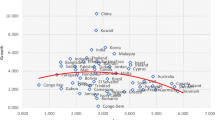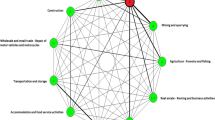Abstract
Research on the effect of democracy on economic growth has not reached a definitive conclusion. Yet, research on the effect of democracy on economic growth volatility has consistently found that higher levels of democracy reduce volatility. Similarly, research has found that higher levels of economic development retard volatility. Using a novel empirical approach, this article presents evidence of an interactive effect between higher levels of democratization and economic development on growth volatility. Specifically, the marginal effect of political development on volatility is negative until countries reach per capita income levels of about $2,700, depending on the conditioning set. The marginal effect is insignificant for countries with higher levels of income. This implies that at a minimum, nearly 50% of the countries in our sample could enjoy less volatile economies with greater political development.
Similar content being viewed by others
References
Acemoglu D, Zilibotti F (1997) Was prometheus unbound by chance? Risk, diversification, and growth. J Polit Econ 105(4): 709–751
Aghion P, Banerjee A, Piketty T (1999) Dualism and macroeconomic volatility. Q J Econ 114(4): 1359–1397
Almeida H, Ferreira D (2002) Democracy and the variability of economic performance. Econ Polit 14(3): 225–257
Anderson TW, Hsiao C (1982) Formulation and estimation of dynamic models using panel data. J Econom 18(1): 47–82
Arellano M, Bover O (1995) Another look at the instrumental-variable estimation of error-component models. J Econom 68(1): 29–52
Arellano M, Bond S (1991) Some tests of specification for panel data: Monte Carlo evidence and an application to employment equations. Rev Econ Stud 58(2): 277–297
Baba S (1997) Democracies and inefficiency. Econ Polit 9(2): 99–114
Barro R, Lee J (2000) International data on educational attainment: updates and implications. CID Working Paper 42
Baum M, Lake D (2003) The political economy of growth: democracy and human capital. Am J Polit Sci 47(2): 333–347
Bekaert G, Harvey CR, Lundblad C (2006) Growth volatility and financial liberalization. J Int Money Finance 25(3): 370–403
Black D (1948) On the rationale of group decision-making. J Polit Econ 56(1): 23–34
Blundell R, S Bond (1998) Initial conditions and moment restrictions in dynamic panel data models. J Econom 87(1): 115–143
Brambor T, Clark WR, Golder M (2005) Understanding interaction models: improving empirical analyses. Polit Anal 14: 63–82
Calderon C, Loayza N, Schmidt-Hebbel K (2005) Does openness imply greater exposure? The World Bank, Policy Research Working Paper Series 3733
Chandra K (1999) The ethnification of the party system in Uttar Pradesh and its consequences. In: Ramashray R, Paul W (eds) Indian politics and the 1998 election. Sage Publications, New Delhi
Dahl R (1972) Polyarchy: participation and opposition. Yale University Press, New Haven
Downs A (1957) An economic theory of democracy. Harper Collins, New York
Dreze J, A Sen (1989) Hunger and public action. Clarendon Press, Oxford
Durham JB (1999) Economic growth and political regimes. J Econ Growth 4(1): 1381–4338
Edwards J (2007) Dynamics of the cross-country growth/volatility relationship. Glob Econ J 7(2)
Edwards J, Sams A, Yang B (2006) A refinement in the specification of empirical macroeconomic models as an extension to the EBA procedure. Top Macroecon 6(2)
Edwards J, Thames F, Edwards M (2006) Measuring the dissemination of volatility across levels of development. Top Macroecon 6(2)
Feng Y (1997) Democracy, political stability and economic growth. Br J Polit Sci 27(3): 391–418
Gerring J, Bond P, Barndt W, Moreno C (2005) Democracy and economic growth: a historical perspective. World Polit 57(3): 323–364
Guiso L, Sapienza P, Zingales L (2004) The role of social capital in financial development. Am Econ Rev 94(3): 526–556
Henisz WJ (2000) The institutional environment for multinational investment. J Law Econ Organ 16(2): 334–364
Helliwell J (1994) Empirical linkages between democracy and economic growth. Br J Polit Sci 24(2): 225–248
Heo U, Tan A (2001) Democracy and economic growth: a causal analysis. Comp Polit 33(4): 463–473
Hoover K, Perez S (2004) Truth and robustness in cross-country growth regressions. Oxf Bull Econ Stat 66(5): 765–798
Islam N (1995) Growth empirics: a panel data approach. Q J Econ 110(4): 1127–1170
Knack S, Keefer P (1995) Institutions and economic performance: cross-country tests using alternative institutional measures. Econ Polit 7(3): 207–227
Koren M, Tenreyro S (2007) Volatility and development. Q J Econ 122(1): 243–287
Kormendi R, Meguire P (1985) Macroeconomic determinants of growth: cross country evidence. J Monet Econ 16(2): 141–163
Kose M, Prasad E, Torrones M (2006) How do trade and financial integration affect the relationship between growth and volatility. J Int Econ 69(1): 176–202
Leblang D (1996) Property rights, democracy and economic growth. Polit Res Q 49(1): 5–26
Leblang D (1997) Political democracy and economic growth: pooled cross-sectional and time-series evidence. Br J Polit Sci 27(3): 453–466
Levine R, Renelt D (1992) A sensitivity analysis cross-country growth regressions. Am Econ Rev 82(4): 942–963
Lipset SM (1959) Some social requisites of democracy: economic development and political legitimacy. Am Polit Sci Rev 53(2): 69–105
Lipset SM (1981) Political man: the social bases of politics. Johns Hopkins University Press, Baltimore
Lohman S (1999) What price accountability? The Lucas Island model and the politics of monetary policy. Am J Polit Sci 43(2): 396–430
Mankiw G, Romer D, Weil D (1992) A contribution to the empirics of economic growth. Q J Econ 107(1): 407–437
Mobarak AM (2001) Why democracies are more stable: models of policy choice and political conflict (mimeograph). University of Colorado, Boulder
Mobarak AM (2005) Democracy, volatility, and economic development. Rev Econ Stat 87(2): 348–361
Munk G, Verkuilen J (2002) Conceptualizing and measuring democracy: evaluating alternative indices. Comp Polit Stud 35(1): 5–34
Nordhaus W (1975) The political business cycle. Rev Econ Stud 42(2): 169–190
Nooruddin I (2003) Credible constraints: political institutions and growth rate volatility. Doctoral Dissertation, Dept. of Political Science, Univ. of Michigan
Olson M (1982) The rise and decline of nations: economic growth, stagflation and social rigidities. Yale University Press, New Haven
Pastor M, Sung JH (1995) Private investment and democracy in the developing world. J Econ Issues 29(1): 223–243
Polity IV Project (2004) Polity IV Dataset. (Computer file; version p4v2004) Center for International Development and Conflict Management, University of Maryland, College Park
Przeworski A (1991) Democracy and the market; political and economic reforms in Eastern Europe and Latin America. Cambridge University Press, New York
Przeworski A, Limongi F (1993) Political regimes and economic growth. J Econ Perspect 7(3): 51–69
Przeworski A, Alvarez M, Cheibub JA, Limongi F (2000) Democracy and development: political institutions and well-being in the World, 1950–1990. Cambridge University Press, New York
Quinn D, Woolley J (2001) Democracy and national economic performance: the preference for stability. Am J Polit Sci 45(3): 634–657
Rodrik D (1997) Democracy and economic performance. Mimeo, John F. Kennedy School of Government, Harvard University
Rodrik D (2000) Participatory politics, social cooperation, and economic stability. Am Econ Rev 90(2): 140–144
Sala-I-Martin X (1997) I just ran two million regressions. Am Econ Rev 87(2): 173–183
Sirowy L, Inkeles A (1990) The effects of democracy on economic growth and inequality: a review. Stud Comp Int Dev 25(1): 126–158
Tavaresa J, Wacziarg R (2001) How democracy affects growth. Eur Econ Rev 45(8): 1341–1378
Wittman D (1989) Why democracies produce efficient results. J Polit Econ 97(6): 1395–1424
Wittman D (1995) The myth of democratic failure: why political institutions are efficient. University of Chicago Press, Chicago
World Bank (2006) World Development Indicators [CD-Rom]. World Bank, Washington, DC
Author information
Authors and Affiliations
Corresponding author
Additional information
Authors would like to sincerely thank the reviewers of our manuscript in providing us with valuable suggestions that made this a better paper.
Rights and permissions
About this article
Cite this article
Edwards, J.A., Thames, F.C. Growth volatility and the interaction between economic and political development. Empir Econ 39, 183–201 (2010). https://doi.org/10.1007/s00181-009-0300-z
Received:
Accepted:
Published:
Issue Date:
DOI: https://doi.org/10.1007/s00181-009-0300-z




